

1858 Birth: Theodore Roosevelt—the future 26th president of the United States—is born in New York City. A dynamic and energetic politician, Theodore Roosevelt is credited with creating the modern presidency. [For further details, Click here.]
1873 Joseph Glidden applies for a patent on his barbed wire design: On this day in 1873, a De Kalb, Illinois, farmer named Joseph Glidden submits an application to the U.S. Patent Office for his clever new design for a fencing wire with sharp barbs. [For further details, Click here.]
1884 Hitler family:
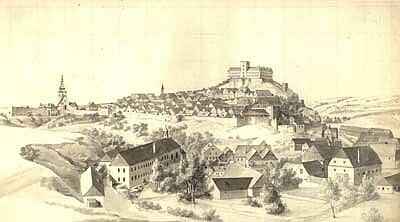
Because of Alois and Klara's anxiety to marry before the birth of Klara's child, a special plea for dispensation had been requested from the Bishop of Linz, who turned it down. Below is the text of an appeal sent this day to Rome requesting special consideration:
Most Reverend Episcopate!
Those who with most humble devotion have appended their signatures below have decided upon marriage. But according to the enclosed family tree [Hitler Family Tree] they are prevented by the canonical impediment of collateral affinity in the third degree touching the second. They therefore make the humble request that the Most Reverend Episcopate will graciously secure for them a dispensation on the following grounds:
The bridegroom has been a widower since August 10th of this year as can be observed from the enclosed death certificate, and he is the father of two minors, a boy of 2 1/2 years [Alois II] and a girl of 1 year and 2 months [Angela], and they both need the services of a nurse, all the more because [the bridegroom] is a customs official away from home all day and often at night, and therefore in no position to supervise the education and upbringing of his children. The bride has been caring for these children ever since their mother's death and they are very fond of her. Thus it may be justifiably assumed that they will be well brought up and the marriage will be a happy one. Moreover, the bride is without means and it is unlikely that she will ever have another opportunity to make a good marriage.
For these reasons the undersigned repeat their humble petition for a gracious procurement of dispensation from the impediment of affinity. -- Braunau am Inn, 10/27/1884. Alois Hitler, Bridegroom. Klara Poelzl, Bride. [For further details, Click here.]
1914 Various:
World War I: The British battleship Audacious sinks after striking a German submarine-laid mine off the Irish coast. [For further details, Click here.]1914 List Regiment:
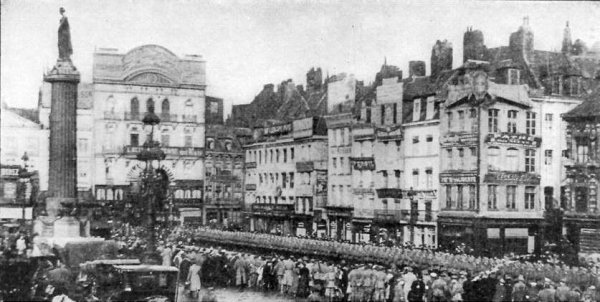
At 1:00 am, before decampment and marching off to the front, Infantry Recruit Adolf Hitler's 1st Company, 16th Bavarian Reserve Infantry, is mustered in the Place de Concert, to hear an "Order of the Day by the Bavarian crown prince against the Englishmen". [For further details, Click here.]
We have now the fortune to have the Englishmen on our front, the troops of that people whose antagonism has been at work for so many years in order to surround us with a ring of enemies and strangle us. We have to thank them above all for this bloody, terrible war . . . . [When] you meet up with this enemy, [show] them that the German cannot be swept so lightly from world history, show them through German blows of a quite special kind. Here is the enemy who stands most in the way of the restoration of peace. Onwards!

From Adolf Hitler's Hepp Letter:
Then morning came. We were now a long way from Lille. The thunder of gunfire had grown somewhat stronger. Our column moved forward like a giant snake. At 9 am, we halted in the park of a country house. We had two hours' rest and then moved on again, marching until 8 pm. We no longer moved as a regiment, but split up into companies, each man taking cover against enemy airplanes. At 9 pm, we pitched camp. I couldn't sleep. Four paces from my bundle of straw lay a dead horse. The animal was already half decayed. Finally, a German howitzer battery immediately behind us kept sending two shells flying over our heads into the darkness of the night every quarter of an hour. They came whistling and hissing through the air, and then, far in the distance, there came two dull thuds. We all listened. None of us had ever heard that sound before.
While we were huddled close together, whispering softly and looking up at the stars in the heavens, a terrible racket broke out in the distance. At first it was a long way off, and then the crackling came closer and closer, and the sound of single shells grew to a multitude, finally becoming a continuous roar. All of us felt the blood quickening in our veins. The English were making one of their night attacks. We waited a long time, uncertain what was happening. Then it grew quieter and at last the sound ceased altogether--except for our own batteries--which sent out their iron greetings to the night every quarter of an hour. In the morning we found a big shell hole. We had to brush ourselves up a bit, and about 10 am there was another alarm and, a quarter of an hour later, we were on the march. After a long period of wandering about we reached a farm that had been shot to pieces and we camped here. I was on watch duty that night and, about one o'clock, we suddenly had another alarm; and we marched off at three o'clock in the morning.
We had just taken a bit of food, and we were waiting for our marching orders, when Major Count Zech rode up: "Tomorrow we are attacking the English!" he said. So it had come at last! We were all overjoyed; and after making this announcement, the Major went on foot to the head of the column.
1915 World War I (Oct 4, 1915 - Feb 29, 1916):

Gefreiter Adolf Hitler's serves with 16 Reserve Infantry Regiment at Fromelles. [For further details, Click here.]
1916 List Regiment: (Oct 9 - Dec 3)
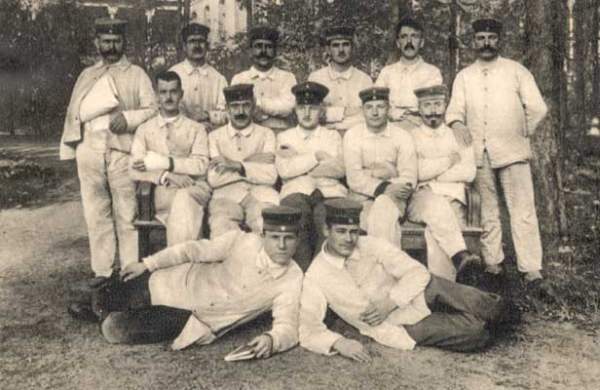
Hitler, who had been fighting almost continuously for two years, finds himself on a hospital train headed for a Red Cross hospital in Beelitz, near Berlin. While his wound is serious, he will recover quickly, and will later write Balthaser Brandmayer: "Am suffering from hunger-induced typhus because I cannot eat bread; additionally I am adamantly denied any sort of jam." [For further details, Click here.]
1917 World War I: Various:
Western Front: The first American soldier fires a shot in World War I. (THP)
1917 List Regiment: (October 17-29)
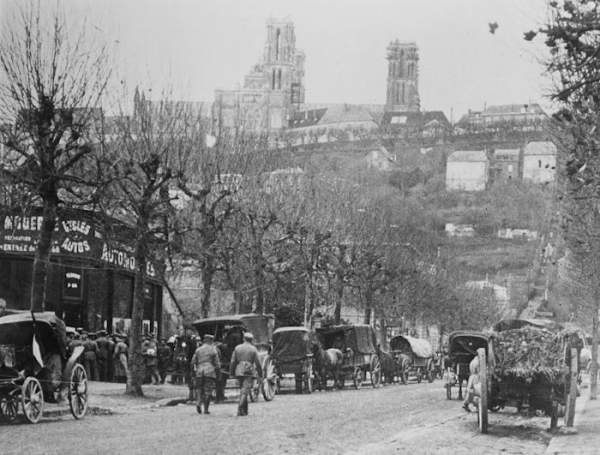
Dispatch Runner Gefreiter Adolf Hitler rejoins his old regiment, now holding down a series of trenches in front of Laon near the Chemin des Dames. While there is "no danger of being taken by surprise, for the canal lay as a natural obstacle between the lines of trenches". But it is still necessary to "build a robust line [since] the highly desired town of Laon lay to our rear . . . . In the first few weeks, we often suffered strong enemy fire. This eased significantly however, in weight as in violence, in December so that one may speak of enjoying Christmas in a quiet sector. [For further details, Click here.]
1918 World War I Various:
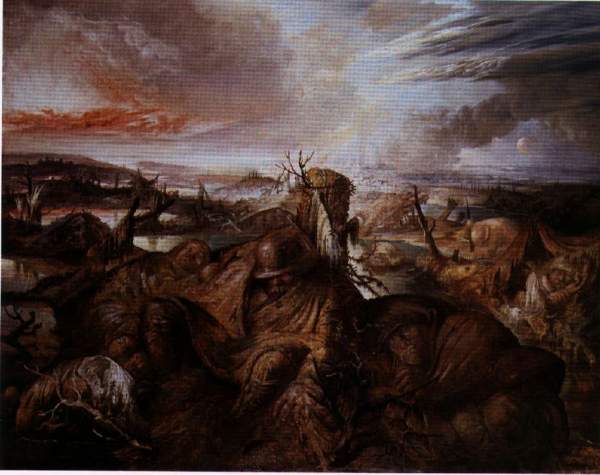
Gefreiter Adolf Hitler--blinded in a gas attack near Werwick on Oct 14--recovers in the Prussian Reserve Hospital at Pasewalk near Berlin. The doctors at this army hospital, on the cutting edge of medical treatments for gassed soldiers, provide Hitler with very good care, and his sight slowly and painfully begins to return to him over these few weeks. Hitler falls into a deep depression. After over four years on the front lines, his fighting days are over. In four years of war, the List Regiment has lost 3,754 dead, 8,795 wounded, with 678 taken prisoner. This is somewhat above the average for the German Armed Forces as a whole.
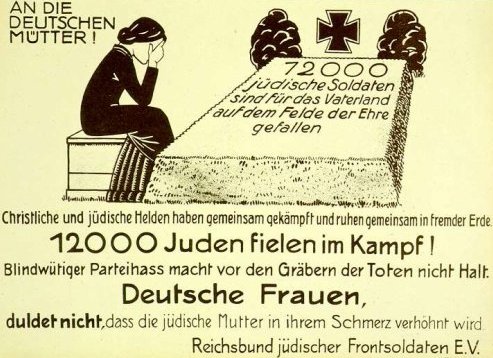
Throughout the length of the war, fifty-nine Jews served in the List Regiment, sixteen of these as officers. Thirty percent of the Jews in the List Regiment were honored for bravery, and seventeen percent were killed in action.[For further details, Click here.]
Ludendorff: German Kaiser Wilhelm II accepts the resignation of General Erich Ludendorff after the failure of his offensive on the Western Front.
From an account of the Austro-Hungarian Army's collapse by the head of the British Red Cross in Italy, G. M. Trevelyan:
On the night of October 23rd-24th, by a brilliant preliminary operation, the northern part of the largest island, the Grave di Papadopoli, was captured by the British infantry, who crossed the swirling flood in flat-bottomed boats, rowed by pontieri of the Italian genio. The way was thus prepared for the great attack by the English and the Italian corps of the Tenth Army on the night of October 26th-27th. The preliminary bombardment began half an hour before midnight, and with it began the rain. It was an anxious business waiting by the river bank for the attack at dawn, knowing that if the rain did not stop—and why should it stop in November?—the whole scheme must miscarry. But stop it did, when the attack began, and it never rained again. [For the full text, Click here.]
1920 Danzig: Allied Ambassadors confirm a decree creating the Free City of Gdansk (Danzig). For further information, Click Here
1922 Italy: liberal Luigi Facta's cabinet resigns after threats from Mussolini that 'either the government will be given to us or we will seize it by marching on Rome'. Mussolini calls for a general mobilization of all Fascists.
1933 Holocaust: The French government cancels orders issued by local municipal authorities to expel German Jewish refugees.
1934 Italy: An assassination plot against Mussolini is exposed.
1935 London: An anti-Nazi rally in Hyde Park draws 18,000 people.
1937 Holocaust: Jewish access to public bathhouses in Danzig is limited to specified hours, one day a week. (THP)
1940 World War II: Various:
De Gaulle sets up the Empire Defense Council: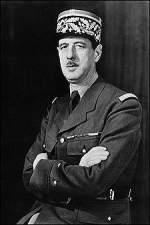
On this day in 1940, French Gen. Charles de Gaulle, speaking for the Free French Forces from his temporary headquarter in equatorial Africa, calls all French men and women everywhere to join the struggle to preserve and defend free French territory and "to attack the enemy wherever it is possible, to mobilize all our military, economic, and moral resources... to make justice reign."
De Gaulle had a long history fighting Germans. He sustained multiple injuries fighting at Verdun in World War I. He escaped German POW camps five times, only to be recaptured each time. (At 6 feet, 4 inches tall, it was hard for de Gaulle to remain inconspicuous.)
At the beginning of World War II, de Gaulle was commander of a tank brigade. He was admired as a courageous leader and made a brigadier general in May 1940. After the German invasion of France, he became undersecretary of state for defense and war in the Reynaud government, but when Reynaud resigned, and Field Marshal Philippe Petain stepped in, a virtual puppet of the German occupiers, de Gaulle left for England. On June 18, de Gaulle took to the radio airwaves to make an appeal to his fellow French not to accept the armistice being sought by Petain, but to continue fighting under his command. "I am France!" he declared. Ten days later, Britain formally acknowledged de Gaulle as the leader of the "Free French Forces," which was at first little more than those French troops stationed in England, volunteers from Frenchmen already living in England, and units of the French navy.
Another Free French movement had begun in Africa, under the direction of Gen. Henri Giraud. De Gaulle eventually relocated to Africa after tension began to build between himself and the British. Initially, de Gaulle agreed to share power with Giraud in the organization and control of the exiled French forces—until Giraud resigned in 1943, unwilling to stand in de Gaulle's shadow or struggle against his deft political maneuvering.
Whatever disagreements the British had had with de Gaulle, Prime Minister Winston Churchill was pleased with the French general's appeal to his countrymen's patriotism and the creation of the Empire Defense Council, which would organize necessary resources for military operations. Churchill believed it would "have a great effect on the minds of Frenchmen on account of its scope and logic. It shows de Gaulle in a light very different from that of an ordinary man." (History.com)
Holocaust: 290 Jews, old people, cripples and the mentally ill from the Old Peoples Home in Kalisz, Poland, are put in a truck, taken just outside of town to the woods at Winiary, and gassed inside the truck with exhaust fumes. All 290 are buried in the woods. (THP)
1941 World War II: Various: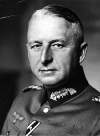
Barbarossa: German forces under von Manstein force a breakthrough at Perekop, thus opening the gate to the Crimean peninsula.
President Franklin Delano Roosevelt Address over the radio on Navy Day:
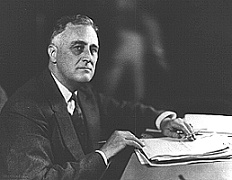
Five months ago tonight I proclaimed to the American people the existence of a state of unlimited emergency. Since then much has happened. Our Army and Navy are temporarily in Iceland in the defense of the Western Hemisphere. Hitler has attacked shipping in areas close to the Americas in the North and South Atlantic. Many American-owned merchant ships have been sunk on the high seas. One American destroyer was attacked on September 4. Another destroyer was attacked and hit on October 17. Eleven brave and loyal men of our Navy were killed by the Nazis. We have wished to avoid shooting. But the shooting has started. And history has recorded who fired the first shot. In the long run, however, all that will matter is who fired the last shot. America has been attacked. The USS Kearny (USS Kearny (DD-432)) is not just a Navy ship. She belongs to every man, woman, and child in this Nation. [For the full text, Click here.]
[See: Why Did the US Join the Fight Against Hitler?]Church and Reich: Bishop Berning reports to Cardinal Bertram that the Gestapo has refused their request for permission to allow Jewish Catholics to wear the Star of David while in church. (THP)
Church and Reich: The Bishop of Limberg informs Bishop Wienken, the episcopate's troubleshooter in Berlin, that the transport of Jews from Frankfurt earlier in the month had included Catholic "non-Aryans" to whom no preferred treatment had been granted. Their fate was especially sad, he said, because they were regarded by the other Jews as apostates (turncoats).
Church and Reich: Harold H. Tittmann, assistant to Roosevelt's special emissary to the Vatican, attempts to get the Pope to issue a public protest against the Germans' mass shooting of hostages. He is told that this could not be done since it would jeopardize the situation of the German Catholics. (THP)
1942 World War II: Various: War in the Pacific:
Allied success in the Solomon Islands campaign prevented the Japanese from cutting Australia and New Zealand off from the U.S. Operation Cartwheel—the Allied grand strategy for the Solomons and New Guinea campaigns—launched on June 30, 1943 isolated and neutralized Rabaul and destroyed much of Japan's sea and air supremacy. This opened the way for Allied forces to recapture the Philippines and cut off Japan from its crucial resource areas in the Netherlands East Indies. [For further details, Click here.]
North Africa: At El Alamein, a counter-attack by 21th Panzer-Division to push the attacking British forces back into the German minefields fails, leaving the Afrikakorps with all of 81 operational tanks.
The Germans defended their positions well and after two days the Eighth Army had made little progress and Bernard Montgomery ordered an end to the attack. When Erwin Rommel returned he launched a counterattack at Kidney Depression (27th October). Montgomery now returned to the offensive and the 9th Australian Division created a salient in the enemy positions. [For further details, Click here.]
1944 Various: Church and Reich:
Slovakia: German forces capture Banska Bystrica, the center of anti-Nazi opposition in Slovakia, bringing the Slovak National Uprising to an end. [For further information, click here.]
1962 The United States and Soviet Union step back from brink of nuclear war:
Complicated and tension-filled negotiations between the United States and the Soviet Union finally result in a plan to end the two-week-old Cuban Missile Crisis. A frightening period in which nuclear holocaust seemed imminent began to come to an end. [For further details, Click here.]
Edited by Levi Bookin (Copy editor) Click to join 3rdReichStudies Disclaimer: This site includes diverse and controversial materials--such as excerpts from the writings of racists and anti-Semites--so that its readers can learn the nature and extent of hate and anti-Semitic discourse. It is our sincere belief that only the informed citizen can prevail over the ignorance of Racialist "thought." Far from approving these writings, this site condemns racism in all of its forms and manifestations.
levi.bookin@gmail.com










Fair Use Notice: This site may contain copyrighted material the use of which has not always been specifically authorized by the copyright owner. We are making such material available in our efforts to advance understanding of historical, political, human rights, economic, democracy, scientific, environmental, and social justice issues, etc. We believe this constitutes a "fair use" of any such copyrighted material as provided for in section 107 of the US Copyright Law. In accordance with Title 17 U.S.C. Section 107, the material on this site is distributed without profit to those who have expressed a prior interest in receiving the included information for research and educational purposes. If you wish to use copyrighted material from this site for purposes of your own that go beyond 'fair use', you must obtain permission from the copyright owner.
Please Note: The list-owner and the moderator of 3rdReichStudies are not responsible for, and do not necessarily approve of, the random ads placed on our pages by our web server. They are the unfortunate price one pays for a 'free' website.



